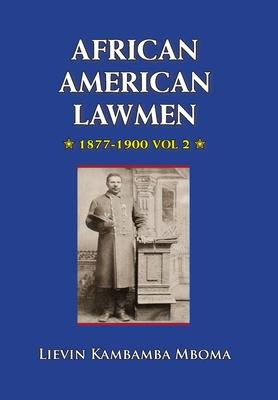AFRICAN AMERICAN LAWMEN, 1877-1900, Vol. 2, discusses the understudied topic of African Americans holding civic and professional positions in the criminal justice system following Reconstruction. For a better understanding of this topic, Lievin Kambamba Mboma tackles the early unofficial lapse of Reconstruction Era policies resulting from rebellion by underprivileged Southern Whites. Namely, regarding the unofficial end of Reconstruction, Mboma briefly explores the lapse of this period as contextualized by rebellions in Alabama, Mississippi, Texas, and Arkansas along with the peaceful end of Reconstruction policies in North Carolina, Virginia, and Georgia. He also examines the position of the federal government on the premature lapse of Reconstruction Era policies, and with expert precision, offers critique of the non-interference of Federal authorities in Southern rebellion as indicated through the policies of President Lincoln, Andrew Johnson, Ulysses S. Grant, and Rutherford B. Hayes. Mboma further finds that Presidential successors, Chester Arthur, Grover Cleveland, Benjamin Harrison, and William McKinley also observed the same non-interference policies as their predecessors.
From Reconstruction failure and federal government responses, Mboma's study progresses to documentary evidence of the emergence of Black union members, their associations with the Republican Party and Lily Whites, and the Black and Tans political phenomenon. Moreover, he analyzes legally restrictive franchise methods utilized by Southern officials, such as the Constitutional Amendment and political party's restrictive election measure, which he describes as tools used to disenfranchise African Americans and circumvent their inclusion in criminal justice. The specific areas of inclusion in the criminal justice system explored by Mboma include African American retentions, exclusion, and re-inclusions in the police force, prisons, judiciary system, and regulatory agencies at the county, state, and federal levels.
The totality of historical documentation analyzed reveals that many African Americans executed political strategies to maintain their presence as political actors at the local and state levels. They furthermore joined the fusion government or switched political parties on the federal level. Additionally, the strategic exodus of African Americans heading North, West, or even East to Liberia to overcome civil and political injustices in the South cannot be discounted. Thus, the works of such leaders as Henry Adams of Louisiana and Benjamin 'Pap' Singleton of Tennessee during the African American exodus from the South are highlighted in the context of connections with the emergence of African Americans in the pollical sphere of the North. This book is an essential addition to the literature on African Americans in the aftermath of Reconstruction for students, professors, scholars and anyone interested in U.S. history and law.
